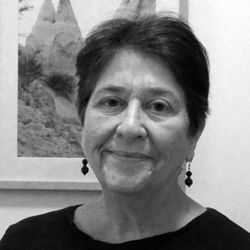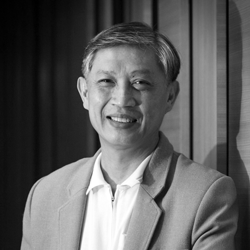Timetable
Click the star to add/remove an item to/from your individual schedule.
You need to be logged in to avail of this functionality.
Log in
Time zone: Europe/London
In welcoming delegates to the conference, this introductory plenary will feature reflections on the conference theme: mobilising methods in medical anthropology, and its development by members of the scientific committee.
Members will also briefly speak about the relevance and remit of the Medical Anthropology Committee of the RAI. In addition, the exciting digital offerings of the conference will be introduced by NomadIT.
Following this short plenary, we will move directly to the keynote Wellcome Medal lecture delivered by Professor Lesley Sharp.
Chair: David Shankland (Royal Anthropological Institute)
Participants: Maya Unnithan, Nadine Beckmann, Christopher Davis, Melissa Parker, Clare Chandler
 Lesley A Sharp
Lesley A Sharp
Barnard College, Columbia University
New York, NY / USA
If the methodologies of medical anthropology entail “continual empirical negotiation,” how might our work engage, specifically, the invisibility, elusiveness, or erasure of categories of persons, bodies, and experiences? The following paired concerns, and their consequences, frame this talk: the failure to see, and that which remains invisible in plain sight. What sorts of methodological negotiations do such concerns entail? By way of illustration, I offer reflections from the field, drawing on examples from research on religious healing, human organ transfer, and interspecies encounters in lab science, each of which necessitated eclectic or unorthodox methodological responses to invisibility and erasure. In so doing, I ask, how might the unexpected and the unforeseen push us along newly imagined paths and toward a methodological praxis of absence?
As a sociocultural and medical anthropologist, Lesley Sharp’s research is grounded in long-standing interests in body symbolics, end-of-life concerns, and the moral underpinnings of human thought and action in contexts ranging from a cosmopolitan plantation community in Madagascar to realms of biomedicine and lab animal research in the US and elsewhere. She is the author of six books, including The Possessed and Dispossessed: Spirits, Identity, and Power in a Madagascar Migrant Town, Bodies, Commodities, and Biotechnologies: Death, Mourning, and Scientific Desire in the Realm of Human Organ Transfer, Animal Ethos: The Morality of Human-Animal Encounters in Experimental Lab Science, and Strange Harvest: Organ Transplants, Denatured Bodies, and the Transformed Self, which won the New Millennium Book Award of the Society for Medical Anthropology. Sharp holds the Barbara Chamberlain and Helen Chamberlain Josefsberg ’30 Chair in Anthropology at Barnard College, and she is a Senior Research Scientist at the Mailman School of Public Health of Columbia University.
She is the recipient of four teaching prizes and numerous residencies, grants, awards, including, most recently, a 2020 John Simon Guggenheim Foundation Fellowship for new research on prison-based end-of-life care in the US.
Lesley Sharp received the Wellcome Medal for Anthropology as Applied to Medical Problems for 2018 and this will be her Wellcome Medal lecture.
Chair: Hayley Macgregor, Professor, Institute of Development Studies, University of Sussex
Discussants: Amanda Vinson, Maya Unnithan
This session will look at the collaboration between healers and health practitioners and will discuss the following films:
Harmoni (2021) Erminia Colucci, Diana Setiyawati, Ade Prastyani
Nkabom (2021) Erminia Colucci, Lily Kpobi and Ursula Read
The Healer and the Psychiatrist (2019) Mike Poltorak
Shadows and Illuminations (2010) Robert Lemelson
If you wish to attend this session, we urge you to ensure you've watched the films beforehand as they will not be shown in this session. You can access the films via Whova.
 Komatra Chuengsatiansup
Komatra Chuengsatiansup
Mobilising Methods, Crossing Borders: Experimenting with “Following Methods” in Studying Antimicrobials in Society
Methods in anthropological inquiry evolve; from the early days of armchair anthropologists relying on travelers’ accounts, to the ethnographic immersion of participant-observers, to virtual ethnographic engagement in cyberspace. While fieldwork is redefined in its locations and practices, this necessitates changes to our modes of inquiry. Shifts in theoretical premises through various disciplinary “turns'' (e.g., linguistic, symbolic, corporeal, reflexive, affective, literary, post-human, and the ontological turn) have prompted fresh research methods. In medical anthropology, ethnographic methods and participant observation have been the methodological cornerstone for decades. At a time when multiplicity and ubiquity have made a multi-sited approach to attune to the connected yet distinctive realities in multiple field sites indispensable, in medical anthropology, studies in indigenous healing systems, illness experience, and cosmopolitan medicine have been, for the most part, single-sited. In our recent studies of antimicrobial resistance in Thailand, we experimented with “following methods” by complementing the multi-sited approach to attend more closely to “following” different kinds of objects as they moved across various boundaries. Practically, this involved following various senses and sensibilities, not only in tracing contingent trajectories of objects being observed but also in negotiating access into different spatial arrangements.
I will discuss cases of multi-drug resistant tuberculosis (migrants, microbes, and expert systems of knowledge) across state borders; examining pathogenicity of citrus greening disease (pathogens, plants, as well as pharmaceuticals) across multiple species and ecologies; and tracing policies and metrics for AMR as global imperatives (procedures, prescription, and performance indicators) across governmental policy-implementation terrain. I will show how “following methods” revealed inconspicuous aspects of complex relationships between species, spaces, and borders. While strengths of following methods bring about new understandings and insights, thresholds of what can and cannot be followed also reveal the uneven ethnographic landscape, calling for further mobilisation of methods.
Komatra Chuengsatiansup is a medical anthropologist with training and practice both in medicine and social anthropology. Through his career he has been committed to the facilitation of interdisciplinary collaboration between anthropology and various medical institutions in areas such as antimicrobial resistance, COVID-19 and emerging diseases, and migrant health. In addition to papers and edited volumes in English and Thai, Komatra is author of 18 books including Multiple-choice Society; Health Assembly: Philosophy, Principle and Spirit; Thai Culture, Thai Health; and Drugs and Community. Over his 15 years as Director of the Society and Health Institute at the Bureau of Health Policy and Strategy, Ministry of Public Health, Thailand, Komatra led research programs on history of medicine; philosophy of science and medicine; community health; civil society and public policy; indigenous healing systems, and elderly care and aging society. Now Director of the Princess Maha Chakri Sirindhorn Anthropology Center (SAC), Thailand, Komatra is responsible for the strategy, conduct and dissemination of anthropological research across the country.
Chair: Clare Chandler
This session will look at TB and homelessness, trauma and refugee deportation, birthing and midwifery, traditional healing, Ebola pandemic and will discuss the following films:
From the Cubby (2021) Joe Spence
Wake up on Mars (2021) Dea Gjinovci
Born (2008) Andy Lawrence and Judith Kurutaç
The Last Bonesetter (2018). Adam Booher, Kathryn Oths
Survivors (2018), We OWN TV
If you wish to attend this session, we urge you to ensure you've watched the films beforehand as they will not be shown in this session. You can access the films via Whova.
This session will look at HIV, cancer, antibiotic resistance, nuclear radiation and discuss the following events:
This is My Face (2018) Angelica Cabezas Pino
In Situ (2021) Marcel Kolvenbach, Leila Passerino, Fernando Sassetti and Natalia Luxardo
Nisha's Story (2020) Paul Cooke
The Day the Sun Fell (2015) Aya Domenig
If you wish to attend this session, we urge you to ensure you've watched the films beforehand as they will not be shown in this session. You can access the films via Whova.
Clarence C. Gravlee, University of Florida
Boundary Making and Boundary Crossing in Medical Anthropology: Methods at the Intersections
Medical anthropology is an expansive field: at once a humanistic and scientific enterprise that crosses (sub)disciplinary boundaries, values multiple ways of knowing, appreciates both basic and applied research, and encompasses the human condition across time and space. This holistic and integrative approach is medical anthropology’s distinctive strength. It also poses a challenge in delineating the range of research methods relevant to the field: Medical anthropologists draw on the whole toolkit of social science, and many also integrate methods from the humanities, public health, biomedicine, and the life sciences. The discipline’s location at so many intersections presents both pitfalls and promise.
In this talk, I sketch a vision of medical anthropology that relishes its role at the intersections and argue for a methodological approach that crosses rather than erects boundaries. I challenge the constraints of three common boundaries in particular: between qualitative and quantitative, social and biological, and researcher and researched. To illustrate the value of transcending these boundaries I draw on collaborative, mixed-methods, biocultural research on health inequities among racialized populations in the Americas—before, during, and likely after the COVID-19 pandemic. I draw attention to the ways that mobilising boundary-crossing methods both contributes to core theoretical interests of medical anthropology and resolves seemingly intractable problems in medicine, public health, and the broader health sciences.
For the closing plenary we are joined by distinguished anthropologists Cheryl Mattingly, Frederic Le Marcis, Christopher Davis, Kate Hampshire and Hayley Macgregor who will reflect on 'hope' as a method in medical anthropology and key themes to emerge from the conference panels. We will conclude with audience reflections and dialogue with the panel members.
Audience contributions and reflections on the conference will be welcomed and appreciated.
Co-chairs: Melissa Parker and Maya Unnithan
Discussants:
Cheryl Mattingly (Professor of Anthropology, University of Southern California, Los Angeles, USA)
Christopher Davis (SOAS, UK)
Frederic Le Marcis (Professor of Anthropology; Dept. des Sciences Sociales, Ecole normale superiore, Lyon, France)
Kate Hampshire (Professor of Anthropology and Global Health, University of Durham, UK)
Hayley Macgregor (Professor, Institute of Development Studies, University of Sussex)
Come one and come all to the end of RAIMed celebration! Live through the Wonder Me platform, a finale where you can let your hair down. Bring a drink, dress to the nines (include dancing shoes) and be ready to listen to some wonderful music as we celebrate the end of the conference. The pandemic might not allow us to be physically together, but that does not mean our souls (or soles for that matter) can't dance as one!